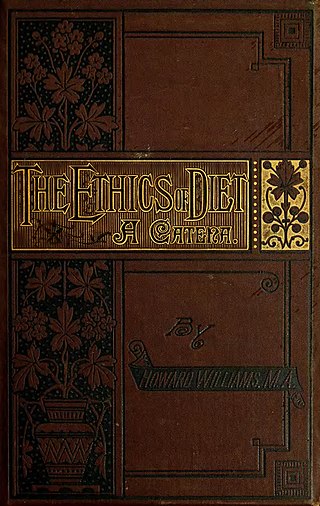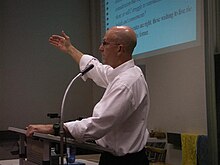
Jan Narveson is professor of philosophy emeritus at the University of Waterloo, in Waterloo, Ontario, Canada. An anarcho-capitalist and contractarian, Narveson's ideology is deeply influenced by the thought of Robert Nozick and David Gauthier.
This index of ethics articles puts articles relevant to well-known ethical debates and decisions in one place - including practical problems long known in philosophy, and the more abstract subjects in law, politics, and some professions and sciences. It lists also those core concepts essential to understanding ethics as applied in various religions, some movements derived from religions, and religions discussed as if they were a theory of ethics making no special claim to divine status.

Carol J. Adams is an American writer, feminist, and animal rights advocate. She is the author of several books, including The Sexual Politics of Meat: A Feminist-Vegetarian Critical Theory (1990) and The Pornography of Meat (2004), focusing in particular on what she argues are the links between the oppression of women and that of non-human animals. She was inducted into the Animal Rights Hall of Fame in 2011.

Stephen Richard Lyster Clark is an English philosopher and professor emeritus of philosophy at the University of Liverpool. Clark specialises in the philosophy of religion and animal rights, writing from a philosophical position that might broadly be described as Christian Platonist. He is the author of twenty books, including The Moral Status of Animals (1977), The Nature of the Beast (1982), Animals and Their Moral Standing (1997), G.K. Chesterton (2006), Philosophical Futures (2011), and Ancient Mediterranean Philosophy (2012), as well as 77 scholarly articles, and chapters in another 109 books. He is a former editor-in-chief of the Journal of Applied Philosophy (1990–2001).

Conversations regarding the ethics of eating meat are focused on whether or not it is moral to eat non-human animals. Ultimately, this is a debate that has been ongoing for millennia, and it remains one of the most prominent topics in food ethics.

Carl Cohen was an American philosopher. He was Professor of Philosophy at the Residential College of the University of Michigan, in Ann Arbor, Michigan, U.S.

Peter S. Wenz is an American philosopher who specializes in environmental ethics. He is Professor of Philosophy and Legal Studies at the University of Illinois at Springfield.
Alastair Norcross is an associate professor of philosophy at the University of Colorado at Boulder, specializing in normative ethics, applied ethics, and political philosophy. He is a defender of utilitarianism.
Contemporary debates about animal welfare and animal rights can be traced back to ancient history. Records from as early as the 6th century before the common era (BCE) include discussions of animal ethics in Jain and Greek texts. The relations between humans and nonnhumans are also discussed in the books of Exodus and Genesis, Jewish writings from the 6th or 5th century BCE.

Michael Huemer is a professor of philosophy at the University of Colorado, Boulder. He has defended ethical intuitionism, direct realism, libertarianism, veganism, the repugnant conclusion, and philosophical anarchism.
The psychology of eating meat is an area of study seeking to illuminate the confluence of morality, emotions, cognition, and personality characteristics in the phenomenon of the consumption of meat. Research into the psychological and cultural factors of meat-eating suggests correlations with masculinity, support for hierarchical values, and reduced openness to experience. Because meat eating is widely practiced but is sometimes associated with ambivalence, it has been used as a case study in moral psychology to illustrate theories of cognitive dissonance and moral disengagement. Research into the consumer psychology of meat is relevant both to meat industry marketing and to advocates of reduced meat consumption.
Vegetarian ecofeminism is an activist and academic movement which states that all types of oppression are linked and must be eradicated, with a focus on including the domination of humans over nonhuman animals. Through the feminist concept known as intersectionality, it is recognized that sexism, racism, classism, and other forms of inter human discrimination are all connected. Vegetarian ecofeminism aims to include the domination of not only the environment but also of nonhuman animals to the list. Vegetarian ecofeminism is part of the academic and philosophical field of ecofeminism, which states that the ways in which the privileged dominates the oppressed should include the way humans dominate nature. A major theme within ecofeminism is the belief that there is a strong connection between the domination of women and the domination of nature, and that both must be eradicated in order to end oppression.

The relationship between Christianity and animal rights is complex, with different Christian communities coming to different conclusions about the status of animals. The topic is closely related to, but broader than, the practices of Christian vegetarians and the various Christian environmentalist movements.
Mark H. Bernstein is an American philosopher and Joyce & Edward E. Brewer Chair in Applied Ethics at Purdue University. He is known for his research on animal ethics.
Nick Zangwill is a British philosopher and honorary research professor at University College London and Lincoln University. He is known for his expertise on moral philosophy, and aesthetics.

An Essay on Abstinence from Animal Food, as a Moral Duty is a book on ethical vegetarianism and animal rights written by Joseph Ritson, first published in 1802.

Reasons for Not Eating Animal Food is an 1814 pamphlet on vegetable diet, which was written by Sir Richard Phillips. It was originally written in 1811, and published multiple times by the author.

The Ethics of Diet: A Catena of Authorities Deprecatory of the Practice of Flesh-eating is an 1883 book by Howard Williams, on the history of vegetarianism. The book was influential on the development of the Victorian vegetarian movement.
Robert William Fischer is an American philosopher who specializes in epistemology and ethics. He is an Associate Professor in Philosophy at Texas State University, a Senior Research Manager at Rethink Priorities, and the Director of the Society for the Study of Ethics and Animals. His books include Modal Justification via Theories, in which he defends his account of "Theory-Based Epistemology of Modality", and The Ethics of Eating Animals, in which he argues that animal agriculture is frequently morally impermissible, but that veganism is nonetheless not morally required.











